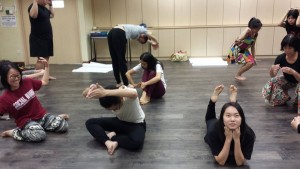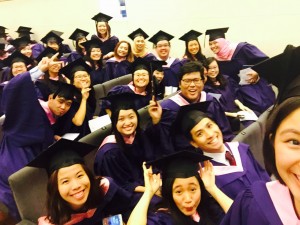
A Home on the Island: Bodies, Objects and Narratives
On 26 June 2015, an eight-hour applied theatre workshop was held from 9am to 5pm at the Theatre Studies Performance Studio, National University of Singapore. The workshop was facilitated by Ms Lee Yueh-lan, Artistic Director of Nanyang Sisters Theatre, and Ms Chen Shu-hui, a long-term member of Assignment Theatre, Even Nearer Playback Theatre and Cross Border Cultural Foundation. The workshop was attended by twelve members of Nanyang Sisters Theatre, seven NUS students, two NUS Theatre Studies alumni and three external participants. Altogether twenty-five participants were present at the workshop.
Founded in 2009 and based in Taipei, Nanyang Sisters Theatre is a theatre company with membership consisting of marriage migrants from various ASEAN countries. The theatre company is part of the NGO group called TransAsia Sisters Association, Taiwan (TASAT), which first began as a literacy program for foreign spouses in 1995. Since the founding of the company, it has created and extensively toured performances based on the life experience of its members, as well as those TASAT has assisted. Through performances, workshops and forums, the mission of the company is to offer support and consultancy to ASEAN marriage migrants, and to enhance public awareness and understanding of marriage migration.
As part of the workshop preparation, each participant was requested to bring an object which represented their understanding and concept of home. Through theatre games and exercises, group discussion, improvisation and scene creation, participants discussed, excavated and reflected upon issues regarding the flow of people, cultures and ideas across borders in an increasingly “flattened” world. Home, migration and globalization were the three central themes addressed in the workshop. The session concluded with Nanyang Sisters presenting the company’s latest performance production Happiness- No U-turn!?. The play gave a glimpse of the lives of those who had chosen marriage as a migratory route in a globalized world. (Contributed by Liang Peilin.)
